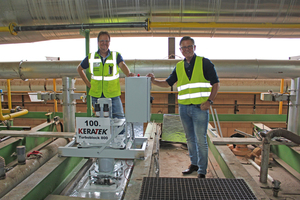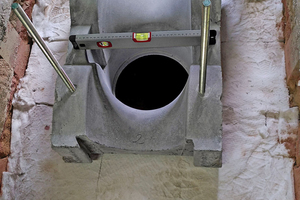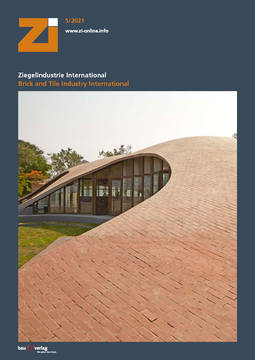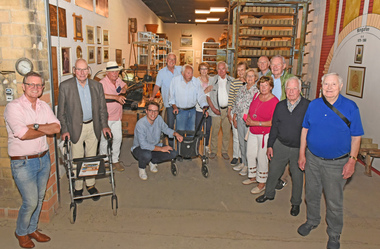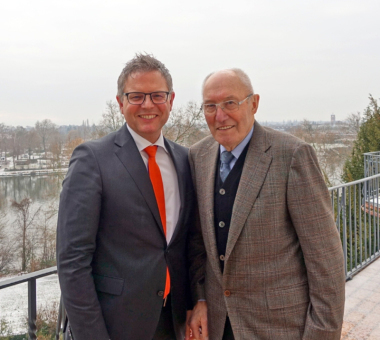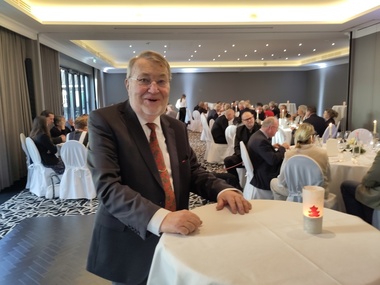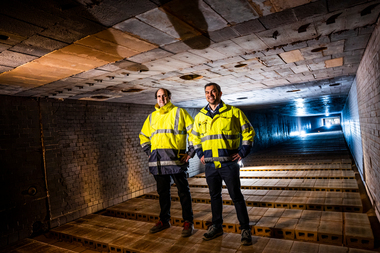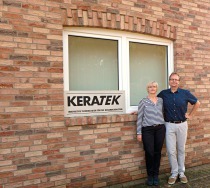Collaboration on product optimization and emission reduction
“My compliments, that looks good,” wrote JUWÖ Operations Manager Heiko Paselt on 4 April 2008 in an email to Karl-Heinz Brakemeier, Keratek’s founder and managing director at the time. A few days earlier, Brakemeier had sent him a brochure on his latest development. And just one year later, the brick plant in Wöllstein became one of the first Turboblock 800 pioneers in Germany.
Brakemeier can still remember it well: “The road up to that point had not been easy, the development of the innovative roof-integrated system kept us busy for almost three years.” The design, the fluid mechanics calculations as well as the mouldmaking and prototyping were financed by the company, which was then still based in Hohenhameln, from its capital resources. Naturally, in the initial years, there were setbacks, for example, concerning the durability of the refractory casting compound and the stability of the bearings. “But, we didn’t give up, something that particularly impressed the first customers,” Brakemeier adds.
It was soon clear to the brick experts from the Rhineland-Palatinate, too, that they had acquired a sound solution for improving product quality. Operations manager Heiko Paselt didn’t let up and raised the bar even higher. At the beginning of 2013, Keratek installed three more kiln atmosphere circulators of the same type, this time in the main firing zone at just under 850 °C. A real challenge for the cooling and stability of the fans integrated in the kiln roof, which the equipment supplier was happy to take on and also mastered.
Energy saving and increased production
The current third phase followed in June 2021. This time, the focus was on energy saving and increased production output. Keratek Managing Director Christian Gäbelein had brought a surprise to the pre-installation consultation. One of the six circulators for the preheating zone was the 100th machine in the series. This milestone was the type of thing JUWÖ boss Stefan Jungk really appreciates, and during the installation, he issued an invitation to a press date. “For us, it was our first choice to work with Keratek again,” says JUWÖ boss Stefan Jungk. “A few years back, we equipped the first half of our tunnel kiln in the Wöllstein’s Plant 3 with Turboblocks and our experience with the system was exceptionally good. With the continuous circulation of the hot air in combination with open setting pattern, the dimensional tolerance of the clay blocks has been significantly improved.”
Thanks to the close cooperation between plant and supplier, over the years a modern firing system with potential for further performance development has been engineered. On the outside, the third generation hardly differs from its predecessors, the improvements only show up in the details, for example the sturdier design of the bearing casing with wider roller bearings and the data logger with network connection in the switch cabinet. With this data logger, operational data can be monitored online or read with a mobile phone app.
Networking as a key to success
With this JUWÖ is taking a big step on the road to climate neutrality, as set out by the German brick and tile industry in its Roadmap 2050. This goal was only achievable with the close cooperation between production plants and equipment suppliers, said Stefan Jungk: “German engineering and networking with the industry and the research institutes is the key to success. As an entrepreneur, but also as president of the Federal Association of the German Brick and Tile Industry, cross-company cooperation is very important to me,” explains Jungk. “Keratek is an outstanding example of this, after all its managing director Christian Gäbelein works in an honorary capacity on the board of the Brick and Tile Research Institute (IZF) in Essen.”
With all celebration surrounding this milestone system, the focus is nevertheless on the project goal. Besides an improvement of the product properties in the near-wall areas of the kiln setting, the Wöllstein plant naturally expects potential savings in primary energy consumption. In line with this was also the optimization of the two conventional circulators directly behind the kiln door, which have been converted by Keratek for extraction in the roof region of the kiln.
Is the development of the Turboblock 800 now complete? “Not by a long way,” says Christian Gäbelein. “We are thinking along the lines of a heated blower, the kiln atmosphere being heated electrically or with hydrogen burners in future. Some interesting research projects are in the pipeline. “The Bad Essen-based engineers still have plenty of ideas, the kiln of the future is equipped with atmosphere circulators, but it already possible to make a start with this technology today. And at JUWÖ in Wöllstein, too, there is some space on and in the roof of the tunnel kiln.

